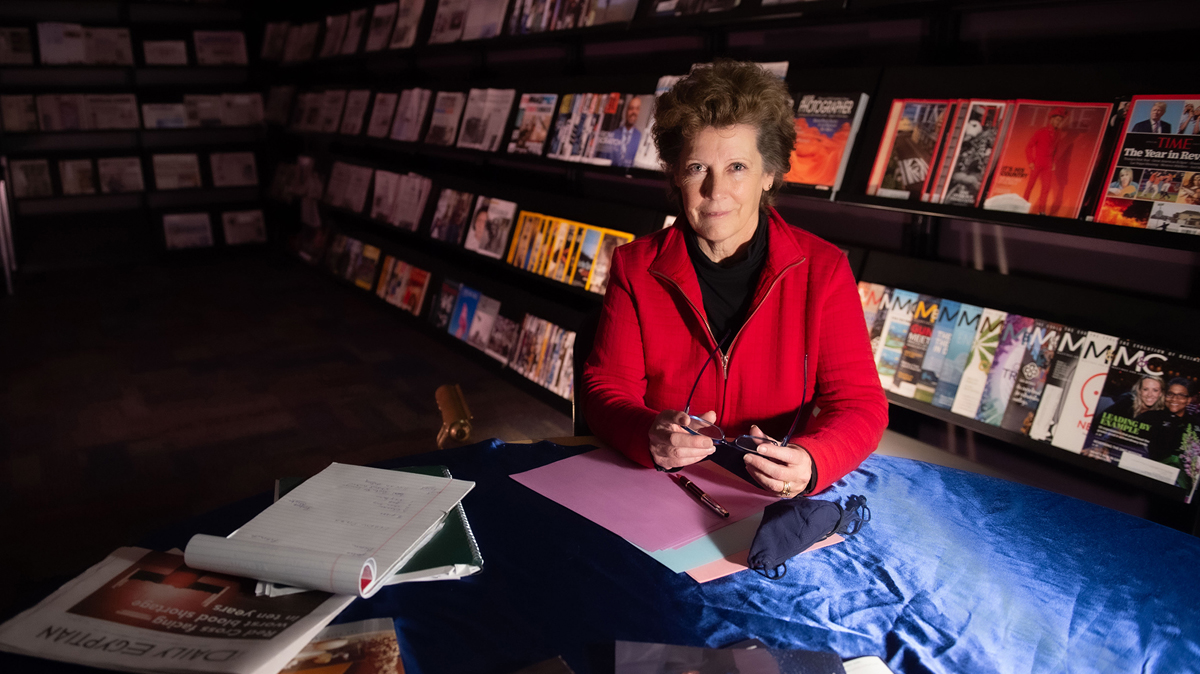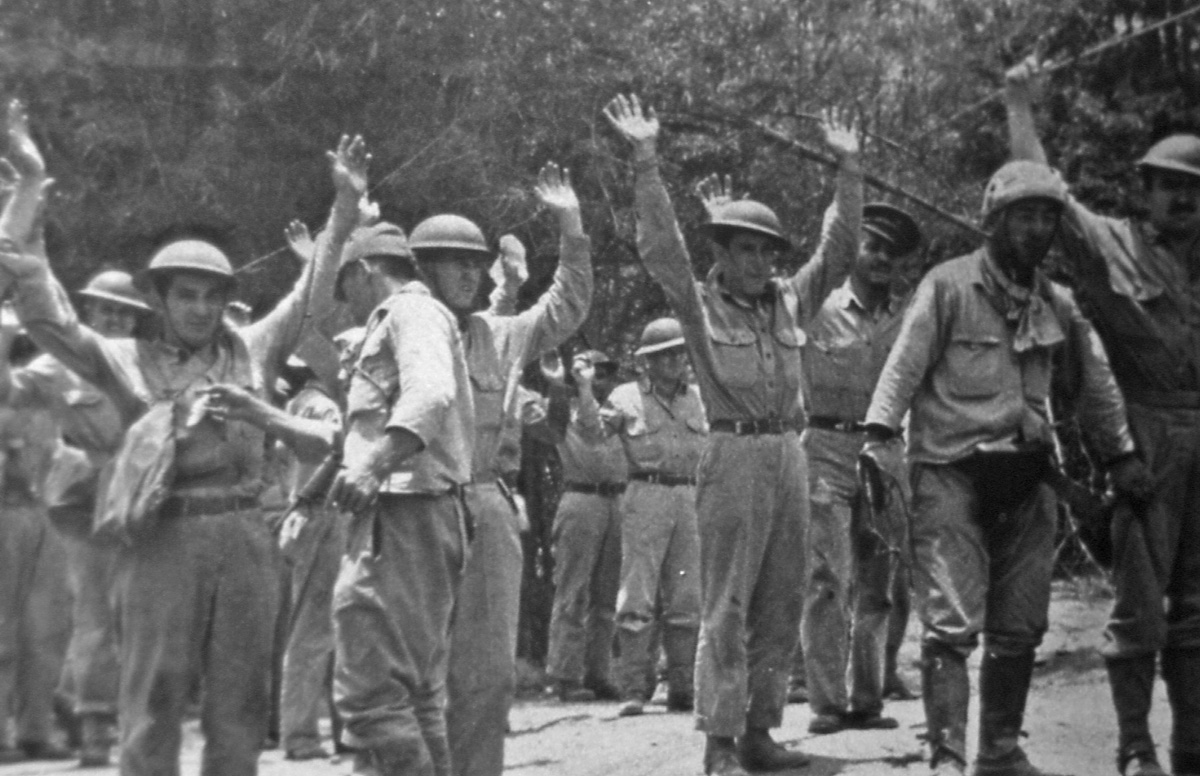
Remembering the Bataan Death March — Jan Thompson, professor and award-winning filmmaker in SIU Carbondale’s School of Journalism, has devoted much of her life into telling the story of the survivors of Japanese POW camps during World War II. She will present comments to a joint congressional Committee on Veterans Affairs Tuesday, March 8, ahead of the 80th anniversary of the Bataan Death March next month. (Photo by Russell Bailey).
March 03, 2022
SIU professor to speak about Bataan Death March before Congressional committee as 80th anniversary approaches
CARBONDALE, Ill. — Jan Thompson, a professor and director of Southern Illinois University Carbondale’s School of Journalism, wants to safeguard the legacy of what American POWs in the Pacific endured in the World War II Bataan Death March in April 1942.
Thompson will present comments before a joint U.S. Senate and House Committee on Veterans’ Affairs as part of a virtual hearing at 9 a.m. Tuesday, March 8. She has spent more than three decades on research and film and radio projects on the POW experience — her late father, Robert, was surrendered to the Japanese on Corregidor about a month after the death march and spent more than three years as a POW before being liberated from a Manchurian prison camp in September 1945.
Thompson's presentation to the joint committee begins at about the 2:09:00 point of the hearing.
Thompson will provide her statement as president of the American Defenders of Bataan & Corregidor Memorial Society, a nonprofit organization that provides continuing education and scholarships. Its predecessor, the American Defenders of Bataan & Corregidor (ABDC), was formed in 1946 by surviving prisoners of war of Japan.
“It is an honor, and I hope that whatever I’m able to say will represent what these individuals had to go through,” Thompson said. “I hope that I’m able to present it so that those who have no idea about this slice of history will have a better understanding and appreciation of the sacrifices that these men and women gave.”
Why remember?
The reasons to not forget this history are simple: The horror of war. She points to Russia’s recent invasion of the Ukraine and the memories of Germany and Japan also invading other countries to start World War II.
“It’s important for history to not be distorted,” she said.
It is estimated more than 10,000 of the more than 75,000 American and Filipino prisoners did not survive the 65-mile, nine-day forced march that began April 9, 1942. It marked the largest surrender in U.S. military history.
Her father was reticent to talk of the horrors he went through, which included surviving three “hell-ships” used to take prisoner to Japan for forced labor. Thompson started accompanying her dad to ABDC conventions in 1991 where some men, many of whom were in their 70s, began to share their experiences.
“It was at that point where I’m starting to hear stories, and it just really opened up my eyes. It was one of those definitive moments,” she said.
“These men were patriots. They believed in democracy,” Thompson said. “They were basically sacrificed; that’s why they became prisoners of war. You would think there would be resentment, and a lot of these men, when I interviewed them, there wasn’t resentment. If they had to do it over again, they would have done it over again, which I find amazing. But they also understand what the prices of freedom means, more so than anybody else.”
Award-winning documentaries
Thompson has, as part of her acclaimed radio, television and film work, three documentaries on Bataan and American POWs:
- “Survival Through Art” narrated by Alec Baldwin.
- “Never the Same: The Prisoner of War Experience” narrated by Loretta Swit.
- “The Tragedy of Bataan” narrated by Alec Baldwin.
She is working with Baldwin on a podcast “Ben Steele, American.” Steele was a death march survivor who worked as a POW in a Japanese coal mine and turned to art recounting his experiences. The podcast will also feature material not used before.
In July 2015, Thompson participated in a ceremony in Los Angeles where Mitsubishi Materials Corp. executives apologized for using American POWs as forced labor in company mines during the war — the first public apology by a Japanese corporation for wartime atrocities. She also accompanied several former POWs in October 2015 to Japan under a reconciliation program Japan’s Foreign Ministry had started a few years earlier.
Previous written statements
Thompson’s appearance before the joint committee will be her first. She previously submitted written statements to the joint hearing to receive legislative presentations of Veterans Service Organizations. Among several recommendations included at the time has been to award, collectively, American POWs of Japan the Congressional Gold Medal, and the encourage Japan to continue the Japan/POW Friendship Program and to expand it into a permanent educational initiative.
U.S. Rep. Mike Bost, R-Murphysboro, is the ranking member on the House Committee on Veterans Affairs and with Thompson’s help, said he introduced the World War II Pacific War Heroes Congressional Gold Medal Act “to award these brave Americans with Congress’ highest civilian honor.”
“The Greatest Generation was ordinary Americans who stepped up and did the extraordinary when our nation and the world needed them,” Bost said. “It is critical that their service and sacrifice does not go without recognition. As we approach the 80th anniversary of the Bataan Death March, I look forward to hearing Jan’s testimony during the House and Senate Veterans’ Affairs Committees joint hearings in early March. It’s vitally important that we hear from our VSO partners to ensure our veterans are accessing the good care and services they have earned.”

